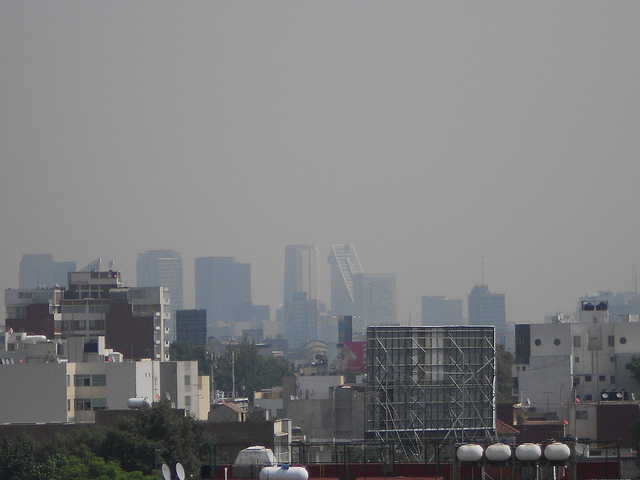Actions Needed Urgently to Tackle Air Pollution - Part 2

PENANG, Nov 14 (IPS) - As evidence mounts on the threats posed by air pollution to both human health and the environment, action must be urgently taken to address this problem.
At the global level, the Paris Agreement that came into force on 10 November aims to get countries to significantly reduce Greenhouse Gas emissions and to better cope with climate change.
In May 2016, Health Ministers approved a global "roadmap" to address air pollution at the World Health Assembly. And the United Nations' sustainable development goals, adopted in 2015, contain accompanying targets for reducing air pollution.
But much more needs to be done, especially at the national level, to seriously tackle this crisis.
The adverse health effects of air pollution have been growing worse with a 8% increase from 2008 to 2013 in deaths globally caused by urban air pollution, according to World Health Organisation data. Although the situation has improved in developed countries, it has deteriorated in most developing countries.
Countering air pollution should thus be a top priority. What should be done? First, more details and data should be collected in all countries, through improvements in monitoring air pollution and its adverse health effects.
Second, a public education campaign is needed to make the public more aware of the dangers of air pollution so they can take actions to prevent the pollution and to avoid being exposed.
Third, and most important, the causes of the pollution must be identified and action plans drawn up to eliminate or reduce the factors these sources.

Outdoor air pollution is caused by transport vehicles that emit pollutants, coal-fired power plants, industrial factories, burning of wastes and fires in forest and agricultural areas. Indoor pollution is mainly caused by the use of fuels that are based on wood and coal.
Besides the direct effects on human health, the pollution is also a major cause of global warming, which in turn also affects health.
It is thus doubly important to tackle these causes. Actions should include the following:
- Reduce vehicle emissions through better energy-efficiency and air-pollution standards for vehicles and control of private transport.
- Give priority to public transport and promote clean transport such as railways, bicycles and walkways
- Phase out of coal powered plants, shift to clean modes of power generation, and promote renewable energy
- Impose strict air pollution controls in industry and phase in clean low-emissions technologies.
- Promote energy efficiency in the design of buildings.
- Phase out the use of wood and charcoal as household fuels used in traditional stoves, and replace them with safe and efficient stoves.
- Reduce waste through recycling and reuse, introduce alternatives to open incineration of solid waste and stop the open burning of household wastes.
- Stop the burning of forests, mangroves and in agriculture; this is the most important to prevent the South-east Asian "haze."
- Take measures so as to adhere to the WHO guidelines for outdoor and indoor air pollution. (The WHO guideline for particulate matter (PM) outdoor pollution is 10 microgram per cubic meter annual mean for particles below the size of 2.5 microns in diameter, and 20 microgram for particles below 10 microns in size).
The problem must also be given the global attention it deserves. In May 2016, the World Health Assembly for the first time adopted a road map to tackle air pollution and its causes. (WHA Document A69/18; 6 May 2016). The four-point road map calls on the health sector to:
- Expand the knowledge base on air pollution, its health effects and effectiveness of policies;
- Increase monitoring of air pollution locally and assess the health impacts of its sources;
- Take on a leadership role in national policies to respond to air pollution and at the global level;
- Build its own capacity to influence policy and decision making processes to take joint action on air pollution and health.
- SDG Indicator 3.9.1 for goal 3 on health (mortality rate attributed to household and ambient air pollution);
- SDG Indicator 11.6.2 for goal 11 on cities (annual mean levels of fine particulate matter (PM) in cities; and
- SDG Indicator 7.1.2 for goal 7 on energy (proportion of population with primary reliance on clean fuels and technologies).
Indeed, drastically reducing air pollution would be tackling the world's biggest health and environmental problems, as air pollution is the major source of deaths and diseases, as well as the main cause of climate change.
Action plans on air pollution are thus urgently needed at both national and global levels.
"Fast action to tackle air pollution can't come soon enough," said Dr Maria Neira, WHO Director, Department of Public Health, Environmental and Social Determinants of Health. "Solutions exist with sustainable transport in cities, solid waste management, access to clean household fuels and cook-stoves, as well as renewable energies and industrial emissions reductions."
We are only at the starting phase of understanding the huge health problem that air pollution causes. We have however been made conscious of the grave crisis that it has caused to the environment.
While the actions needed are quite clear, getting them implemented will be an immense challenge, as the causes of air pollution are presently so embedded in modern lifestyles and economic structures.
© Inter Press Service (2016) — All Rights ReservedOriginal source: Inter Press Service
 Global Issues
Global Issues